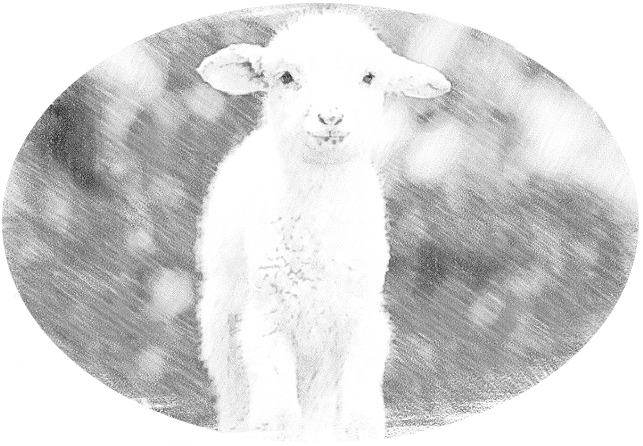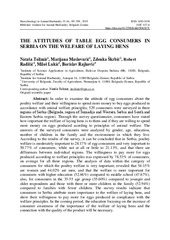| dc.creator | Tolimir, Nataša | |
| dc.creator | Maslovarić, Marijana | |
| dc.creator | Škrbić, Zdenka | |
| dc.creator | Radišić, Robert | |
| dc.creator | Lukić, Miloš | |
| dc.creator | Rajković, Borislav | |
| dc.date.accessioned | 2019-12-26T10:30:07Z | |
| dc.date.available | 2019-12-26T10:30:07Z | |
| dc.date.issued | 2019 | |
| dc.identifier.issn | 1450-9156 | |
| dc.identifier.uri | http://r.istocar.bg.ac.rs/handle/123456789/663 | |
| dc.description.abstract | In order to examine the attitude of egg consumers about the poultry welfare and their willingness to spend more money to buy eggs produced in accordance with animal welfare principles, 529 consumers were surveyed in three regions of Serbia (Belgrade, region of Šumadija and Western Serbia and South and Eastern Serbia region). Through the survey questionnaire, consumers have stated how important the welfare of laying hens is to them and if they are willing to spend more money on eggs produced acording to principles of animal welfare. The answers of the surveyed consumers were analyzed by gender, age, education, number of children in the family and the environment in which they live. According to the results of the survey, it can be concluded that in Serbia, poultry welfare is moderately important to 28.17% of egg consumers and very important to 50.77% of consumers, while not at all or little to 21.13%, and that there are differences between individual regions. The willingness to pay more for eggs produced according to welfare principles was expressed by 78.53% of consumers, on average for all three regions. The analysis of data within the category of consumers for which the poultry welfare is very important, revealed that 54.15% are women and 44.02% are men, and that the welfare is more important for consumers with higher education (52.66%) compared to middle school (47.67%), also, for consumers in the 35-55 age group (55.60%) compared to younger and older respondents and those with three or more children in the family (52.94%) compared to families with fewer children. The survey results indicate that consumers in Serbia attribute more importance to the welfare of laying hens, and show their willingness to pay more for eggs produced in compliance with the welfare principles. In the coming period, the education focusing on the increase of consumer awareness of the importance of the welfare of laying hens and the connection with the quality of the product will be necessary. | en |
| dc.language.iso | en | sr |
| dc.publisher | Institute for Animal Husbandry, Belgrade | sr |
| dc.relation | info:eu-repo/grantAgreement/MESTD/Technological Development (TD or TR)/31033/RS// | sr |
| dc.relation | info:eu-repo/grantAgreement/MESTD/Integrated and Interdisciplinary Research (IIR or III)/46012/RS// | sr |
| dc.rights | openAccess | sr |
| dc.rights.uri | https://creativecommons.org/licenses/by/4.0/ | |
| dc.source | Biotechnology in Animal Husbandry | sr |
| dc.subject | welfare | sr |
| dc.subject | laying hens | sr |
| dc.subject | consumer | sr |
| dc.subject | eggs | sr |
| dc.subject | survey | sr |
| dc.subject | Republic of Serbia | sr |
| dc.title | The Attitudes of Table Egg Consumers in Serbia on the Welfare of Laying Hens | en |
| dc.type | article | sr |
| dc.rights.license | BY | sr |
| dcterms.abstract | Толимир, Наташа; Шкрбић, Зденка; Рајковић, Борислав; Лукић, Милош; Радишић, Роберт; Масловарић, Маријана; | |
| dc.citation.volume | 35 | |
| dc.citation.issue | 4 | |
| dc.citation.spage | 387 | |
| dc.citation.epage | 398 | |
| dc.citation.rank | M24 | |
| dc.identifier.doi | 10.2298/BAH1904387T | |
| dc.identifier.fulltext | http://r.istocar.bg.ac.rs/bitstream/id/3504/08.BAH-19-4-8-27.11.2019.-Tolimir-et-al..pdf | |
| dc.type.version | publishedVersion | sr |


